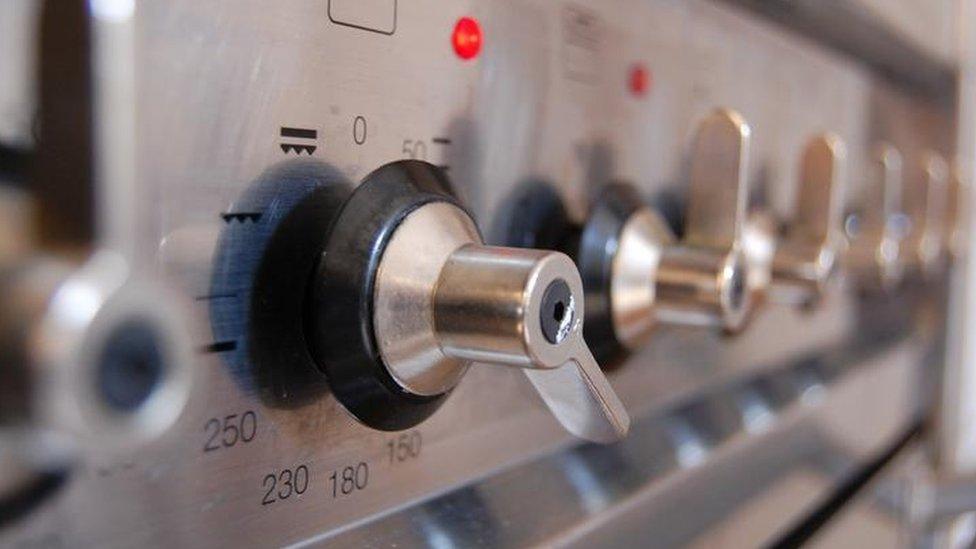Energy firms under investigation are handed new customers
- Published

Two energy suppliers which have been handed the domestic customers of collapsed firms are themselves under investigation by the regulator Ofgem.
Economy Energy and Our Power recently ceased trading and their customers have been automatically switched to Ovo and Utilita respectively.
Both Ovo and Utilita are themselves the subject of continuing inquiries over the treatment of customers.
They say the issues are historic and Ofgem has been rigorous.
What happens when a firm goes bust?
In the past year, a number of suppliers have ceased trading, with Economy Energy and Our Power both collapsing in January.
When this happens, customers are automatically transferred to a new supplier. These customers' supplies are protected but their tariff is not.
Any credit they had with their old supplier - in cases where they had used less energy than they had paid for - is carried over. However, in cases of this kind, customers are given a new tariff with the new supplier that may be more expensive than their current deal. They are given the opportunity to switch.
The so-called "supplier of last resort" system is quick and ensures that customers' gas and electricity supplies are not cut off.
What about these recent cases?
Many of the customers of failed firms have faced difficulties owing to poor customer service, so they may question Ofgem's decision to move them to suppliers who are currently under investigation.
Ofgem is investigating whether Ovo gave inaccurate estimates to its customers over how much energy they had used during the winter of 2016-17, potentially leading to inaccurate bills.
In January, Ovo successfully bid for the custom of the 235,000 customers who needed a supplier when Economy Energy ceased trading.

Meanwhile, Utilita was one of four suppliers which was put under investigation by Ofgem following a review of how suppliers handled customer complaints.
It has now been handed 31,000 customers from collapsed supplier, Our Power.
A spokesman for Utilita said the company had made vast improvements in its customer service, and that Ofgem conducted a thorough review before awarding them the new customers.
An Ovo spokeswoman said: "Ofgem's investigation relates to historic customer issues and does not reflect Ovo today."
An Ofgem spokesman said: As part of the supplier of last resort process we were again crystal clear with Utilita about our expectations on customer service improvement and they have made a firm commitment to improve.
"They have also assured us that they have a specific plan for addressing outstanding concerns, including significantly driving down call waiting times and making it easy for all customers to contact them.
"The tariff Utilita will put these customers on is also competitive in comparison with the prices for other suppliers for serving these customers."
A new price cap will be announced this week. What does it mean?
A cap on the cost of energy for loyal customers who have not switched suppliers came into force at the start of January.
Many households in England, Scotland and Wales on default tariffs - such as standard variable tariffs - would have seen their energy bills fall as a result.
Consumers in Northern Ireland have a separate energy regulator and already have a price cap. Those on a prepayment meter already have a price cap in place.
The cap is per unit of energy, not on the total bill. So people who use more energy will still pay more than those who use less. The cap is on the unit price of energy, and the standing charge.
Ofgem said the cap meant that typical usage by a dual fuel customer paying by direct debit would cost no more than £1,137 a year, an estimated average saving of £76 a year for 11 million people.
The level of the cap is updated every six months, at the start of April and the start of October, this year and next year, and possibly beyond.
Where the cap will be set from April 2019 will be announced on Thursday.
What is likely to happen?
The cap is expected to rise, making energy more expensive for the customers on these default tariffs.
Widespread speculation has suggested that it will rise by about £100. Ofgem is expected to allow the companies to charge more owing to the greater cost of energy on the wholesale market than was previously the case.
A complex set of calculations is behind the setting of the cap, which includes factors such as allowances for operating costs and profits.
The introduction of the cap has reduced the difference between the most expensive tariffs on the market from about £300 a year to £200 a year.
However, Ofgem and consumer groups are stressing that customers who choose to switch to a better deal than a default tariff can save money. They may also want to consider customer service scores when choosing their gas and electricity provider.
Organisations such as Citizens Advice rank suppliers, external on criteria such as switching and billing.
- Published11 January 2019

- Published15 October 2018

- Published1 January 2019
